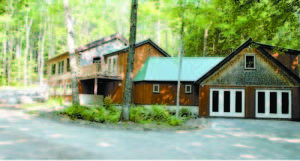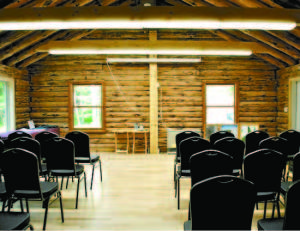LEA opens the Maine Lake Science Center

LEA’s Maine Lake Science Center nestled in the woods adjacent to Pondicherry Park. (Photo by Bridie McGreavy)
By Leigh Macmillen Hayes
Special to The News
Last week, I sat in the conference room of the brand new Maine Lake Science Center, in awe of this space, which the Lakes Environmental Association (LEA) has created over the past year.
To be honest, it was a seven-year undertaking since Executive Director Peter Lowell, his staff and the board of directors began talking about the concept of a research center to enhance the work LEA does. And perhaps more accurately, it’s been in the process for the last 45 years, since the inception of LEA, because it’s the baseline data that has been collected for all those years, which will direct the initial research questions.
For the last seven years, I’ve served as an LEA director. What a privilege it has been to follow the formation of this center with walls.
That may sound like an odd label for a building, but as Dr. Bridie McGreavy, the consulting executive director of the MLSC recently explained to a group in Lovell, the research center began as a center without walls. According to McGreavy, it started with the idea of developing different types of research partnerships, including hiring research fellow Amanda Pratt to monitor for the potentially toxic algae Gloeotrichia in a collaborative effort with Bates College; installing HOBO temperature sensors on various lakes in conjunction with the University of Maine at Farmington; and teaming with Colby College for the launch of the GLEON Buoy, which collects a variety of data on Highland Lake. All of this creates comparative studies to connect the dots from one lake to the next.
Why build a science center when we have a building on Main Street in downtown Bridgton? That was a question the board seriously considered for several years, but we eventually realized that our capacity for the type of interdisciplinary research that will help us understand and address lake-related sustainability problems would be greatly enhanced by providing researcher housing and additional lab space.
Testing 38 lakes and ponds in the Upper Sebago Lake watershed to create profiles of oxygen, temperature, phosphorus, chlorophyl, conductivity and pH balance created an historic baseline, but times are changing, and sadly, the lakes are changing with them.
“It’s time to move beyond doing the same work that’s been done since 1970,†Lowell said.
“We have a good baseline understanding of many of the lakes and ponds in this region and a good understanding of lake science,†said McGreavy. “With this understanding, we have increasingly realized the need for a more focused look at trends in order to better prepare for the future.â€
The Lakes Science Advisory Board comprised of university and interdisciplinary lake research experts was formed several years ago to determine the questions that need to be answered. It’s important that we understand what is impacting our lakes, such as weather events and pollution, in order to go forth and identify future steps needed to protect them.
Our lakes and mountains drive the local economy and provide the quality of life we enjoy, so we need to think about the bigger picture. What does the future of the lake region look like? What are the “tipping points†that will cause our lakes to degrade? What can we do to make the changes necessary to preserve them?
Lowell and Board President Sean Dundon, plus staff, began to visit and/or contact various science centers and collegiate faculty in Maine and across the nation to learn from and network with them. What threatens our lakes and what can we do about these threats became the focus.
Three years ago, Peter Lowell and Maggie Shannon, a longtime water quality advocate, formed the Maine Lake Leaders as an ad hoc committee meant to bring regional organizations with staff, like LEA, together to share knowledge and information. Their mantra became the following: “Lake scientists estimate that we have less than two decades to make the changes required to preserve our lakes — or we will lose them forever.†A sobering thought certainly.
The original vision for the science center was a lakeside facility. We soon realized a multimillion-dollar center on a lake wasn’t the answer.
“Using existing infrastructure and situating it so it is convenient to the elementary school and downtown Bridgton makes for a much more multiuse and sustainable facility,†McGreavy said.
One year ago, the LEA board agreed to purchase the former Flint property off Willet Road, adjacent to Pondicherry Park. As they say in real estate, location is everything. This property is close to downtown Bridgton, including Stevens Brook Elementary School, Bridgton Hospital and Hannaford. It is easily accessible and not far from the Main Street LEA building.
The center provides increased capacity to support collaborative research, state-of-the-art equipment, a teaching lab and other versatile space. It promises to become the centerpiece of LEA’s lake research.
Over the past year, local contractors, board members and other volunteers joined Lowell to transform the building from a former camp to the MLSC. The garage has become an education space, wet lab and office overlooking Pondicherry Park. Former bedroom space has been updated to house researchers. And the main floor kitchen, dining and living room now serves as a 50-person conference center. Local Boy Scout Troop 149 is creating a trail and boardwalk to connect to the Pondicherry Park trail network.
The center will expand communication and cooperation with scientists and the lake advocacy community for the benefit of our Maine lakes and those beyond the border. Education programs for school groups, local municipalities and the public will be increased.
Already, Amy Kireta, a Ph.D. student with the University of Maine’s Climate Change Institute, has stayed at the center and is working with LEA Education Director Adam Perron to create curriculum that addresses climate change and water quality. She and board member, Dr. Orrin Shane, are developing an overview of how other centers are dealing with climate change. Kireta is also working on a collaboration with the Kezar Lake Watershed Association’s Climate Change Observatory.
Both McGreavy and Kireta stress the need for communication in order for these projects to work. Kireta added that there’s a need for resilience, not only on the capacity of a lake to absorb disturbance and remain recognizable in both its structure and function, but also on we humans who rely on the lakes in our region.
The lakes are calling to us to be better stewards, to maintain their identities and abilities to respond to stresses in a dynamic and flexible manner. Kireta said that in order to do this, we must learn from and work with different stakeholders and be ready to adjust or modify according to the conditions we and the lakes face.
By monitoring the lakes for long-term data to understand their history, we can develop ways to respond to their needs. That’s where the MLSC steps in — to help lake associations, land trusts and an engaged community understand what’s stressing our lakes now and figure out what we can do to help them bounce back. The science will inform a new set of land-use standards.
LEA has had a long tradition of educating students and citizens to safeguard our natural resources and local economies. Now, it is time to define the problems our lakes face and develop solutions in collaboration with others in order to make our lakes sustainable.
It’s been a fast-paced year for LEA. The building is complete and the grounds are in order. The center will be open to the public soon and LEA will establish visiting hours. Not only is it the centerpiece of lake research, but for the next year, the Maine Lake Science Center will be the centerpiece of LEA’s fundraising campaign.


